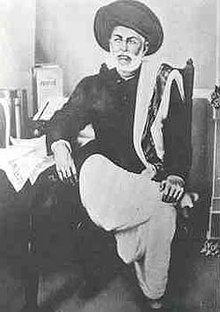Mahatma Jyotirao Govindrao Phule, more popular as Jyotirao Phule, was a thinker, activist, social reformer, writer, philosopher, theologist, scholar and editor. He was also called Mahatma Jotiba Phule. Phule and his wife, Savitribai Phulewere pioneers of women's education in India. His great contribution was prominent in the field of education,agriculture, caste system, women and widow upliftment and removal of untouchability. He is very popular for his efforts to educate women of the lower caste as well as the masses.
Early Life of Jyotirao Phule
He was born on 11 April 1827 in Katgun, Satara, British India (present-day Maharashtra, India). His family belonged to Mali caste perceived to be inferior caste by certain section of society. Govindrao, his father, was a vegetable vendor. Originally his family was known as Gorhays and they came from Katgun, a village in Taluka- Khatav, District- Satara. His grandfather Shetiba Gorhay settled down in Poona (Pune).
Association with Satyashodhak Samaj
On 24 September 1873, Jyotirao formed Satyashodhak Samaj (Society of Seekers of Truth) with the objective of liberating the Shudras to prevent their "exploitation" byBrahmins. He was the first president and treasurer of Satyashodhak Samaj.
Phule, through the organization - Satya Shodhak Samaj refused to regard the Vedas as sacrosanct. He also opposed the idea and even rejected the Caste system. This organization also propounded the spread of rational thinking and refused the need for Brahmin priestly class as educational and religious leaders. He was an aboriginal of India and founded Satyadharma and certainly not gave up his faith. He was also against those particular Brahmins who were using religion and blind faith of masses for their own monetary gains. But Jyotiba had many Brahmin personal friends and he even adopted a Brahmin boy as his heir. He made a will giving his large property after his death to this Brahmin boy. After Phule's death on 28 November 1890 (aged 63) his followers continued the Samaj campaign to the remotest parts of Maharashtra.
Efforts to Uplift Girls by Jyotirao Phule
After educating his wife, he opened a school for girls in India in August 1948. This was actually the second school for girls in India. He supported widow remarriage and started a home for upper caste widows in 1854. In the same year, he also started a home for new-born infants to prevent female infanticide.
Title Earned by Jyotirao Phule
History says that according to Keer, Phule was bestowed with the title of Mahatma. Phule had devoted his 40 years of life to social service fighting for the rights of the 'bahujans'. To mark this achievement, the bahujans and satyashodhak leaders and workers decided to felicitate Jotirao Phule. Hence on 11 May 1888, he was honoured with the title of ‘Mahatma’ by another social reformer from Mumbai, Rao Bahadur Vithalrao Krishnaji Vandekar.
Published Works of Jyotirao Phule
Some of the notable published works of Jyotirao Phule include Tritiya Ratna, Brahmananche Kasab, Gulamgiri, Ishara, Gramjoshya sambhandi jahir kabhar, Akhandadi Kavyarachana etc.
 in India. His work extended to many fields including EDUCATION
in India. His work extended to many fields including EDUCATION , agriculture, caste system, women and widow upliftment and removal of untouchability. He is most known for his efforts to educate women and the lower castes as well as the masses. He, after EDUCATING
, agriculture, caste system, women and widow upliftment and removal of untouchability. He is most known for his efforts to educate women and the lower castes as well as the masses. He, after EDUCATING his wife, opened the first school for girls in India in August 1848.
his wife, opened the first school for girls in India in August 1848. . Phule is regarded as an important figure of the Social Reform Movement in Maharashtra.
. Phule is regarded as an important figure of the Social Reform Movement in Maharashtra.


